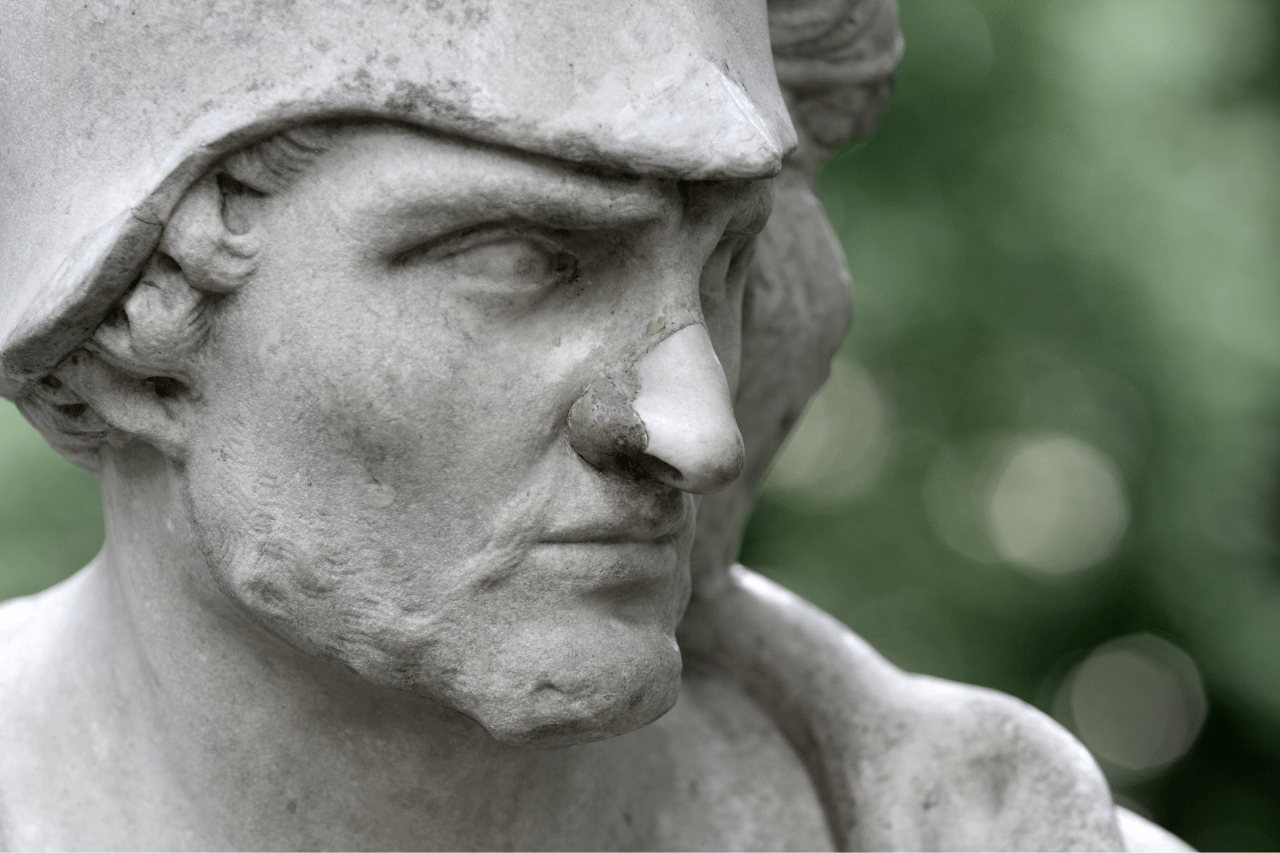One way of talking about mental health is to say that the ‘key’ (which we never see!) is not to interfere with what’s going on. It’s not sufficient to merely say this however because interfering is pretty much all that we ever do and so if we were to take it into our heads to try to stop our habitual interference then this would mean that we’d be ‘interfering with our interfering’ and that way we would be creating even more trouble for ourselves.
How on earth do we not ‘interfere’ therefore? How do we not ‘interfere’ when the attempt to seize interfering is itself an interference? Why even start talking about ‘psychological non-interference’ in the first place if it is such an impossibility? Given that most approaches in therapy are forms of interference (this is by definition true, since whoever heard of such a thing as ‘a therapy which does not have the aim of changing people in some way?) would we even call this ‘therapy’? Is this even ‘an approach’?
We would actually be quite justified in saying that ‘non-interference’ isn’t a form of therapy, isn’t a type of ‘approach’, precisely because there is no intention to bring about any change. Non-interference may not be ‘an approach’, but it is nevertheless ‘a thing’. It’s ‘a thing’ because it can happen; it’s a thing’ because it’s actually a possibility for us (even though it isn’t a ‘willled possibility’). It’s a possibility because what we’re talking about here happens very naturally when there isn’t some sort of control going on. What we talking about here involves ‘consciousness rather than coercion’ and there’s no way that we can say that being conscious is ‘an approach’…
Consciousness clearly isn’t a willed act – it’s not something that we do ‘on purpose’, by any means. It would be very bizarre to suggest that we could. We can ‘pay attention’ or ‘concentrate’ on purpose for sure but that’s not the same as being conscious. When we ‘concentrate’ what we’re doing is playing a game – we’re ‘controlling without acknowledging that we are’. Some things are deemed important and all the rest is therefore by default ‘unimportant’, and so we pay attention to what we have deemed important and we ignore everything else. This isn’t consciousness therefore – it’s a game we’re playing with ourselves without knowing that we are playing it and for this reason the absence of consciousness is specifically required; the absence of consciousness is specifically required because we can’t play a game if there is consciousness there! There has to be ‘ignoring’ going on in order to play a game.
Whoever plays plays freely, says James Carse, and the only way we can play a game is therefore by veiling from ourselves the freedom that we have not to play. We engineer this self-veiling – as we have just indicated – by concentrating on what we have decided to be important and ignoring everything else. The thing about this manoeuvre is that once we have – by default – designated something as being ‘unimportant’ (or ‘error’) then it is completely forgotten about so that – for us – it no longer exists. We’ve disregarded it and then we have disregarded the fact that we have disregarded it – as we’ve just said, we turned it into ‘error’ and the thing about anything that has been labelled as ‘error’ is that we discount or dismiss it just as soon as we come across it. That’s the whole point of ‘error’ – the point is that it is a designation that lets us know that what we have labelled as such simply needs to be gotten rid of (so that it no longer shows up in our instrument panel as a red flashing light). It’s not something valued in its own right, it’s only there to be gotten rid of.
When we pull off this manoeuvre (and what we’re talking about here is the ubiquitous operation of the thinking mind and not something strange or exotic) then we create a very particular type of world – we create ‘the Domain of the Known’. The Domain of the Known isn’t really a world at all, for all that it looks like one, or manifests itself as one. The ‘Domain of a Known’ is a very peculiar place, although – when we are actually in it – we’re not in any position to see this. The Domain of the Known as a peculiar place because it is created by eliminating what we are calling ‘error’ and it just so happens that what we are calling ‘error’ is reality itself, which – naturally enough – puts an entirely different complexion on things. If the error we were eliminating really was ‘an error’ then that would be one thing but because what we actually mean when we use this term is something that we ourselves have decided isn’t important’ (i.e. something we don’t want to look at because it doesn’t fit in with our assumptions or expectations) then this is another thing entirely – clearly, this exercise is less legitimate than we are taking it to be!
What we are calling ‘the Domain of the Known’ is actually a game, in other words – it is ‘a world that is only true because we have said that it is’. We are however very far indeed from seeing that this is the case. Saying that we are very far indeed from seeing that the Domain of the Known is a game is rather a ridiculous way of putting it really – how could the Domain of the Known be ‘the Domain of the Known’ when it’s only a game? Very obviously, the term ‘the known’ then becomes profoundly meaningless. The known is simply something that we have created by ignoring our own ignoring so it isn’t actually a ‘real’ attribute at all –it isn’t a an actual ‘real’ or positive attribute and yet we take it as being so and once we do take it as being so then we create a whole new whole type of life for ourselves, whole type of living that is fundamentally based on this thing that we call ‘knowing’ (or ‘the known’) when the truth is that there is no such thing as that. How peculiar is this therefore? We are all familiar with what it’s like to be living in the Domain of the Known where everything is either known or knowable and where we ourselves are also ‘either known or knowable’. We are all very ‘matter of fact’ about this scenario but what about the other scenario – the scenario that we are setting out here where all our so-called knowing is false knowing and where the so-called known things that we do apparently know are simply ‘hyperreal fictions’? What does this insight do to our blandly over-simplified picture of the world? Was there ever anything more fatuous than a situation we spend our lives pretending that there is this thing called ‘the world of the known’ and take this preposterous pretence absolutely seriously?
So when, as therapists, we ‘interfere’ (or we put into place some kind of intervention or procedure that is designed to result in some kind of ‘known or measurable change’ what exactly are we doing here? Very clearly, we’re simply ‘carrying on with the game’ the same way that we are always carrying on with it. We are routinely inhabiting the world of the known and the world of the known contains only two things: it contains ‘right choices’ and it contains ‘wrong choices’, it contains choices which reliably lead to either ‘desirable outcomes’ or ‘undesirable ones,’ and so what we have here is ‘the Paradigm of Control’. That this should be the way of things seems perfectly reasonable to us and yet the whole setup is really nothing more than fantasy as far as mental health is concerned. Control (or any sort of ‘management’) is always interference when it comes to mental health because mental health is by its very nature a non-equilibrium type of thing. We don’t really know ‘how we are supposed to be’, despite the fact that we automatically assume that we absolutely do and this means that we don’t know what is ‘error’ what is not ‘error’. Because we don’t know what is error and what is not we don’t know what the ‘right choices’ are and so the Paradigm of Control fails us in the biggest way that anything ever could fail us.
Coming back to what we started off this discussion by saying, the only helpful art to learn here is clearly the art of non-interference. Non-interference is what it all comes down to and yet we are also very bad at it. Non-interference is something we just don’t ‘get’ at all. This isn’t to imply that we should just be ‘indifferent’ or ‘uncaring’ of course – we are absolutely committed to mental well-being (our own and everyone else’s) but we know at the same time that there’s nothing tactical we can do to bring it about. It’s not under our control. More than this, we know that everything we deliberately do brings us in the opposite direction – which is the principal lies behind the ancient Chinese philosophy practice or philosophy of Wu Wei. Wu Wei (or ‘not doing’) might sound laughably easy to our sophisticated Western years but it reveals herself to be the most difficult thing that is; as naturally it is since the art of Wu Wei is the art of living itself. We might think that the key to life is control or power (i.e. we might think that it is ‘the ability to win’) but clearly it isn’t – the more we control the more we need to control and the more we invest in power the more we have to defend that power. Control isn’t an art (of course), it is on the contrary what we do – by default – when we have no ‘art’ – when we are working blind on the basis of either fear or greed. ‘Non-interference’ isn’t a state of being we can obtain via control because if we try to compel ourselves not to interfere then this just becomes another form of interference – it becomes a disguised form of interference. The art of interference might be said therefore to involve ‘not interfering with our own interfering’. We aren’t trying to be specially improved people or in any way different from the way that we actually are – we’re not trying to be in any way ‘less interfering’.
Having said this, we also have to realise that even this intention (the intention not to interfere with our own interfering) constitutes a subtle form of ‘trying to be different’ – we want to become the sort of person who doesn’t interfere with their own interference and this as an unattainable ideal, just like all the rest of the unattainable ideals we try to live up to throughout our lives. This just isn’t going to work out however; this isn’t going to work out because interference (or control) is all we know. It’s all the rational mind knows anyway and whatever we do or try to do we always do or try to do via the rational mind. In this way, the idea of non-interference is an insoluble paradox, is an impossibility, and this is why we can say that the art of non-interference is the ‘hardest of all things’ – we’re just not able to do it, we’re not able to do it because we keep turning it into a strategy. What trips us up therefore is that we can’t see that the thinking mind is incapable of not interfering – we are so used to be thinking about everything that it never occurs to us that everything thought does is interference. Somehow, we need to become separate from the thinking mind; we need to become separate from the thinking mind and yet there is no method by which we can do this.
Non-interference comes from awareness (or ‘being’), not from purposeful doing, which is the projection of the thinking mind (or ‘the projection of the self’). All of our thinking, all of our purposeful doing, takes us away from the source of our well-being and there is nothing we can do about this. The exercise of our personal will takes us away from our own well-being and there’s no way around this. This isn’t the disaster that it tends to sounds to us however – we aren’t really dependent upon our ‘personal will’ to save us; we very much believe that we are it is true, but we aren’t. Believing that our personal will save us is the ‘via erratum’ of the alchemists. What ‘saves’ us, if we may continue to use this word, exists outside of our personal will or preferences. We could say that what comes to our aid (and does always work in our best interests, unlike the interfering thinking mind) is the movement of the universe itself (so to speak) which is ‘a movement from an unknown origin to an unknown destination’ (which is something that Jung says about consciousness). This also corresponds to what David Bohm refers to as ‘the Holomovement’, which he says is the ultimate way of describing the universe (even if it isn’t really ‘a description’ in the usual sense of the word). We can’t say where this movement came from or where it is going, but we can say that it is ‘going’. It certainly isn’t ‘standing still’!
Our well-being (or ‘true individuality’) isn’t some kind of stale equilibrium state and yet all the thinking mind can ever do is bring us into some sort of equilibrium state or other. Our idea of ourselves, which we are always trying to promote or defend, is another equilibrium state. My goals and my ‘self’ (i.e. the one who strives after the goals) are one and the same equilibrium state. Ourselves and our goals are all part of the same Domain of the Known, and this domain, as we have said, is only a game that we are playing. There is no ‘Domain of the Known’ and for this reason our ‘well-being’ does not reside there. Anywhere but there! Our personal will (of course) is always directed towards the known, but the known is no good for us. The known is the malaise which we daily suffer – it is ‘the curse which we foolishly embrace’. Where life is to be found is in the Unknown, and the current of life will always bring us there, the matter how stubbornly we might fight against it.







Pretheesh
Simone Weil on attention
“To attend means not to seek, but to wait; not to concentrate, but instead to dilate our minds. We do not gain insights, Weil claims, by going in search of them, but instead by waiting for them.”
Interesting article on
https://lithub.com/simone-weils-radical-conception-of-attention/
Most people even Scott Peck had written as if attention is some heroic act of tensing up so much to not let yourself waver–I think she, Simone Weil, challenges these in her writings on attention even perhaps better than J Krishnamurti.